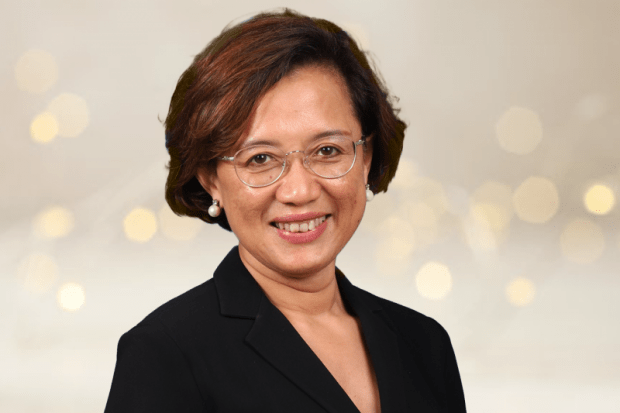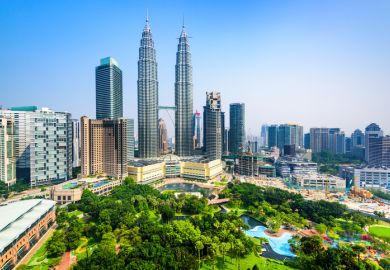When Adeeba Kamarulzaman takes the reins at Monash University Malaysia, part of her brief will be to convince locals not to follow her example.
“Malaysian parents still send their children overseas to study, when we have a world-class university right here,” Professor Kamarulzaman said. “One of my jobs would be to encourage parents like myself to consider Monash Malaysia.”
It is advice that the infectious diseases expert failed to heed herself, both as a parent and a student. Her son recently completed his master’s studies in London, while she undertook her medical studies at Monash University’s mother campus in the Melbourne suburb of Clayton.
Now a professor at the University of Malaya (UM), where she was previously dean of medicine, the HIV research pioneer will take over as Monash Malaysia president in May. “It feels like I’m coming back full circle,” she said.
Her husband, stock exchange boss Muhamad Umar Swift, is also a Monash alumnus, whose father was a long-serving Monash anthropology professor. “Many of my friends are still there, and several are in leadership positions. They’ve reached out and said: ‘How can we work together?’
“Given that we want to move towards multidisciplinary programmes in education and research, it does help that I already know a number of people in Clayton and [Monash’s] Indonesia [campus].”
With a brief to boost research collaboration, it also helps that her network includes researchers in UM and its partner institutions in the US. Professor Kamarulzaman is a principal investigator in collaborative projects with Johns Hopkins and Yale universities to develop a master’s programme in health research ethics and to train doctoral students in implementation science.
Her contact book was also bolstered by recent appointments as co-chair of the World Health Organization’s Science Council – alongside Cornell University Nobel laureate Harold Varmus – and as Malaysia’s first commissioner with the Global Commission on Drug Policy.
Her job description at Monash Malaysia includes improving its research output, which means focusing on its strengths. “Research dollars here [in Malaysia] are not in abundance…so working smartly and working in partnership is going to be key. We need to leverage on the talent and expertise in Australia and in Malaysia.”
As a private university, Monash Malaysia attracts less research funding than its public counterparts in a country surrounded by research heavyweights such as Singapore, Hong Kong and Taiwan. Their proximity generates plenty of collaboration opportunities but sometimes unflattering comparisons.
And as a branch campus of a foreign university, Monash Malaysia does not appear in most national or international rankings even though, Professor Kamarulzaman said, it has comparable publications output to the local front runners.
She said the campus was able to maintain “reasonably healthy” foreign enrolments during the pandemic. Numbers have risen this year, reflecting a national rebound in student interest. Malaysia’s recently reappointed higher education minister, Mohamed Khaled Nordin, wants this trend to accelerate, saying the country must become a “centre of universal knowledge” – partly to boost its own academic calibre.
Professor Kamarulzaman said outbound mobility had served the nation well, with people who had studied overseas coming back and contributing. “Research output from Malaysia has gone up leaps and bounds in the last 10 years.” She said inbound mobility could have a similar effect, but cautioned against the focus on volume implied in the nation’s goal for 250,000 foreign enrolments by 2025.
“Personally, I’m less obsessed with absolute numbers than with quality, especially quality of postgraduate students. We must work to attract students, but also be realistic about what’s possible. There’s a lot of competition.”
Professor Kamarulzaman also urged pragmatism regarding Mr Khaled’s desire for more overseas campuses of Malaysian universities. The country already has three – Universiti Sains Malaysia’s medical college in India, Universiti Kebangsaan Malaysia’s offshoot in Java and private UCSI University’s branch campus in Bangladesh – but as dean at UM, she “resisted” proposals to open branches in south Asia. “It’s a lot of work, and we’re already stretched.”
She also expressed scepticism about Mr Khaled’s vow to put an end to political appointments in the higher education ministry, agencies and tertiary institutions – a habit that had left university executives and boards lacking crucial diversity.
“The public universities have been screaming for autonomy for many, many years,” she said. “But autonomy doesn’t mean you have to go and look for your own money. It has to go with financial autonomy, including the ability to determine a fee structure that is realistic.”
That had been lacking in Malaysia, where harsh funding cuts preceded the pandemic. “If you want to make Malaysia the educational hub, you want to raise the standards of the public universities. And that comes…with the right financial investment.”
Register to continue
Why register?
- Registration is free and only takes a moment
- Once registered, you can read 3 articles a month
- Sign up for our newsletter
Subscribe
Or subscribe for unlimited access to:
- Unlimited access to news, views, insights & reviews
- Digital editions
- Digital access to THE’s university and college rankings analysis
Already registered or a current subscriber? Login







